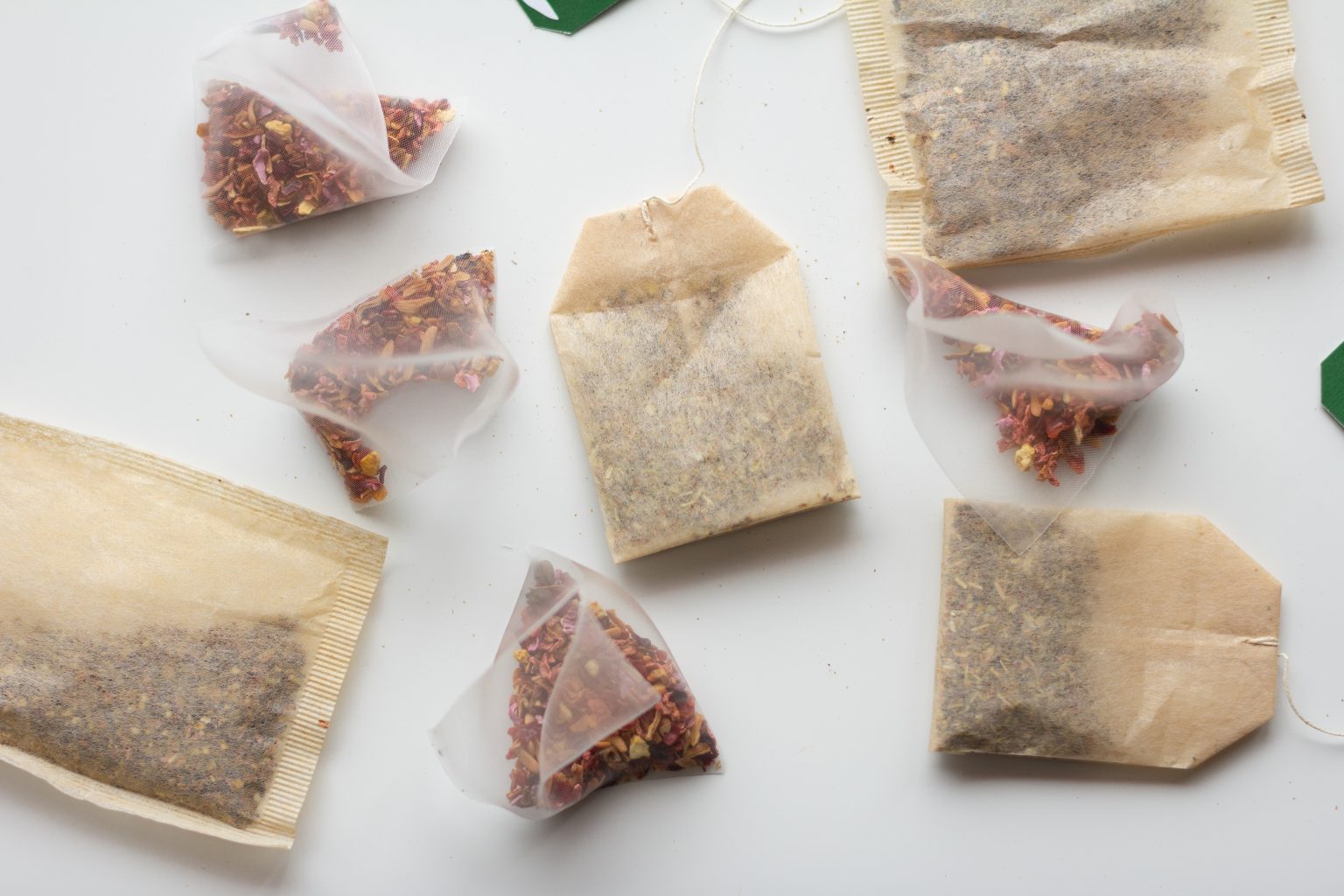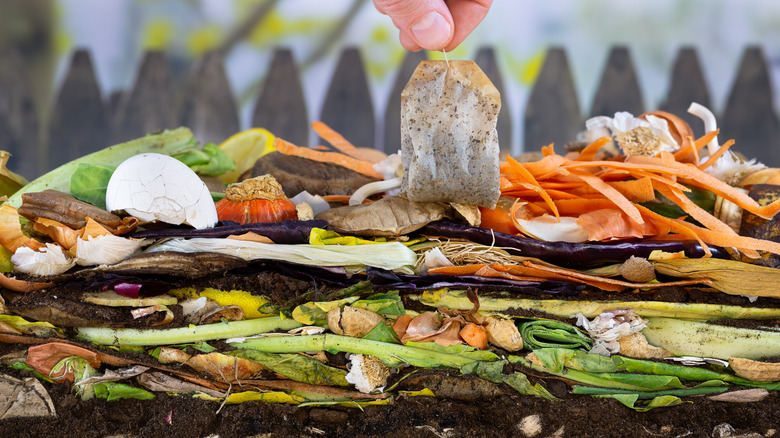Tomatoes are a popular addition to a vegetable garden, particularly for the novice just starting out with a small plot. The plants are incredibly easy to grow, love the heat and sunshine, and are very productive over their long summer season. Truly, beyond planting the seedlings well past the last spring frost and making sure theyre sufficiently watered, theres not much else you need to do to keep them healthy. However, there are additional ways to benefit your tomato plants and keep them thriving. One trick in particular involves something most people can find in their kitchen: a simple tea bag.
There are many ways tea can be used to boost the hardiness and output of your tomato plants. Tea bags and the leaves inside can be used as a supplemental fertilizer, pest repellent, mulch, or an antifungal treatment. And because all true tea comes from the same plant, any authentic tea can be used in these various applications. This will ensure that your tomato plants flourish all season long.
Are Tea Bags Good for Tomato Plants? A Detailed Guide
As a passionate home gardener, I’m always looking for natural ways to help my plants thrive. Recently, I came across the idea of using tea bags to benefit tomato plants. Intrigued, I decided to dig deeper and do some research on this gardening hack. In this article, I’ll share what I learned about using tea bags for tomato plants.
An Overview of Using Tea Bags for Tomato Plants
Tea bags contain components that can help tomato plants in a variety of ways when added to the soil. The tea leaves inside the bags provide nutrients like nitrogen, phosphorus, and potassium which are key for healthy plant growth. Additionally, tea contains tannins which can help repel certain pests. The nutrients and tannic acid in tea bags can also improve the soil quality and drainage.
While using tea bags does offer benefits for tomato plants, it’s important not to overdo it. Excessive amounts of tea in the soil can cause nutrient imbalances and altered pH levels which can damage plants. Moderation is key when using tea bags as fertilizer.
Benefits of Tea Bags for Tomato Plants
Let’s take a more in-depth look at some of the specific benefits tea bags can offer tomato plants
Provide Essential Nutrients
The leaves inside tea bags contain nitrogen, phosphorus, potassium, calcium, and other nutrients that are vital for plant health and growth. Nitrogen promotes leafy foliage, phosphorus aids root development, and potassium boosts overall plant vigor and disease resistance. These nutrients are naturally released into the soil as the tea bag breaks down.
Enhance Soil Quality
Adding used tea bags to the soil introduces beneficial organic matter which improves soil structure and water retention. Tea leaves also encourage earthworm activity which further aerates the soil. The nutrients released also enrich the soil over time.
Act as a Natural Pesticide
The tannins found in tea can help deter certain pests like aphids, mites, and whiteflies. The caffeine in tea also has antifungal properties to protect against fungi and bacteria. Placing tea bags around the base of the plants helps create a barrier.
Improve Drainage
The tea leaves help aerate the soil and improve drainage and water circulation. This prevents soggy soil and reduces the risk of root rot.
Boost Tomato Flavor
Some gardeners claim the tannins in tea can make tomatoes taste better by improving their complex flavor. However, more research is needed to fully validate this benefit.
Proper Methods for Using Tea Bags on Tomato Plants
While tea bags can help tomato plants, it’s vital to use them properly to get the full benefits. Here are some tips:
-
Use organically grown tea bags without pesticides, flavors, or other additives that could harm plants.
-
Steep the tea bags in hot water for at least 5 minutes before applying to the soil.
-
Place the used tea bags about 6 inches from the plant stems, buried 2-3 inches deep in the soil.
-
Reapply new tea bags or freshly brewed tea every 2-3 weeks during the growing season.
-
Also use the tea as a foliar spray on the leaves to boost the benefits.
-
Monitor your plants for signs of distress like wilting, discoloration, or poor growth.
Risks and Precautions When Using Tea Bags
While tea bags can be beneficial, a few precautions are warranted:
-
Excessive use can lead to nutrient imbalances and soil pH changes which damage plants.
-
Caffeinated tea may harm plants if very high amounts leach into the soil. Opt for decaf or herbal teas.
-
Avoid tea with additives. Flavors, pesticides, and other ingredients could be toxic to plants.
-
Not all plants respond well to tannins. Monitor plant health and adjust tea usage as needed.
-
Tea shouldn’t replace proper fertilization and cultivation practices for optimal plant health.
Other Organic Methods to Help Tomato Plants Thrive
In addition to using tea bags, there are other organic options to try:
-
Compost: Mix in food scraps and garden waste to create nutrient-rich compost for your tomato plants.
-
Coffee grounds: Used coffee grounds provide nitrogen and can be worked into the soil or used as mulch.
-
Eggshells: Crushed eggshells add calcium and help deter pests like slugs.
-
Banana peels: High in potassium, composted peels make a good fertilizer for tomatoes.
-
Wood ash: Adds potash, calcium, and magnesium to the soil. Spread lightly around plants.
When used properly and in moderation, tea bags can be a simple, natural way to provide benefits to tomato plants. The nutrients, organic matter, and pest deterring properties in tea can enhance soil quality, plant health, tomato flavor, and more when applied correctly. Along with other organic methods like composting, tea bags are a handy gardening hack to help your tomato plants thrive. Just be careful not to overdo it, and monitor your plants for signs of stress. Happy growing!

Use tea bags as fertilizer and mulch

Tea contains tannic acid, so when tea bags are added to the soil, they enrich it with nutrients while also lowering the pH balance (indicating an increase in acidity). Tomato plants love slightly acidic soil, so by mixing used tea bags into the soil around your tomato plants or by cutting open the bags and releasing the leaves themselves, youll make your tomatoes very happy. Furthermore, the leaves can be eaten by worms, which will then fertilize and enrich the soil with their waste. In addition, tea bags can be added to your compost pile. The tannic acid will speed up the decomposition process until your compost has created a hearty fertilizer of its own.
Another way to use tea bags in and around your tomato plants is as a mulching product. In addition to keeping weeds at bay, when tea bags are placed on top of the soil or just under it, they will retain water and ensure the soil doesnt get too dry. Used tea bags are just as good as new ones too, so theres no worry about being wasteful or creating an extra expense. Simply reuse the bags youve previously made tea with.
Grow Bags For Tomatoes, How and Why in 2020!
FAQ
Can you put tea bags on tomato plants?
Tea bags and the leaves inside can be used as a supplemental fertilizer, pest repellent, mulch, or an antifungal treatment.Aug 12, 2023
What is the best natural fertilizer for tomatoes?
Generally, animal dung from non-industrial farms is the most popular organic fertilizer used in tomato cultivation — cow, horse, and sheep-goat manures work best.
Are coffee grounds good for tomato plants?
Yes, coffee grounds can be beneficial for tomato plants when used properly. They improve soil structure, drainage, and aeration, and they also attract beneficial microorganisms and earthworms.
Which plants don’t like tea leaves?
